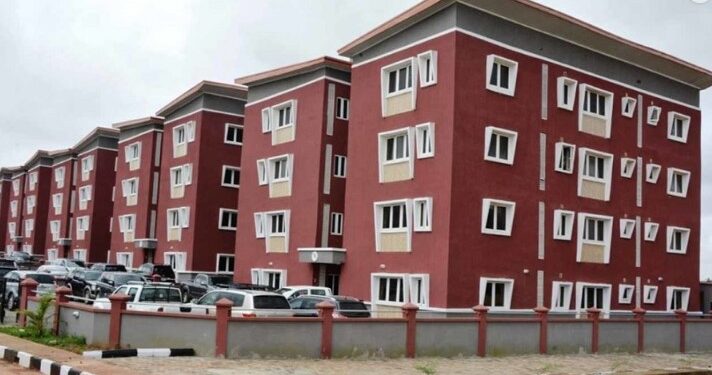News
Lagos rent surges over 80% as tenants battle housing shortage

Many Lagos residents are groaning under sharp rent hikes, with some apartments seeing increases of up to 80% or more in just a year.
This arises as housing demands continue to exceed supply, leaving many families trapped, struggling to meet new rental obligations or facing the costly alternative of relocation.
In Mushin Olosha, Abosede Sanya saw her two-bedroom flat rent jump by 87.5%, from N800,000 to N1.5 million per year.
Despite a 20% rise in her household income, the new rate strained her budget. “I stayed because other apartments now charge similar amounts,”she told Nairametrics, adding that relocation would mean extra costs: agency fees, lease agreements, and property damages.
Abosede’s story mirrors the experience of thousands across Lagos, from Ogba to Ikorodu, where tenants face rent spikes with few viable options.
Trapped tenants and a tight rental market
Across the metropolis, tenants told Nairametrics that steep rent adjustments are leaving them cornered. In Ogba, real estate agent Temidayo Ademosu of Arrowhead Homes and Properties said a two-bedroom flat that rented for N400,000 was pegged at N800,000 after the tenant moved out.
“For prospective tenants trying to negotiate, the rent might drop to N600,000, but comparable units with minor improvements already go for N1.5 million to N2 million,” Ademosu said.
He added that while some landlords traditionally wait until the third year of a tenancy before reviewing rents, others adjust earlier in response to inflation and market conditions.
“There’s an apartment in my portfolio rented for N7.5 million annually that has stayed the same for two years; it varies widely,” he noted.
In Ikorodu’s Olorijo Maya, Daniel Kornwi has paid N150,000 annually since 2023, but neighbours who have lived longer saw rents double to N300,000. Similarly, in Igbogbo, Samuel Etefiareported a 50% increase in his three-bedroom apartment, from N700,000 to N1.05 million, after the landlord upgraded it with plaster-of-Paris finishing.
In Akute, an Ogun State suburb sharing boundary with Lagos, resident Michael Gbenga faced a 103% increase from N320,000 to N650,000 within two years.
“I don’t plan to move yet because other houses are either unavailable or overpriced,” he said.
For many Lagosians, high relocation expenses compound the problem. Agency commissions, lease renewals, and repair costs make staying put, even with a strained budget, the only practical choice.
Beyond Lagos: Abuja and Port Harcourt feel the heat
The rent surge extends beyond Lagos. In Abuja’s Nyanya district, Opeyemi Toriola saw his one-room self-contained apartment rise from N400,000 to N750,000. “Even on the outskirts, you can’t get a similar place below N1.2 million now,” he said.
In Port Harcourt, Temple Ugwu, Principal Partner at Blumeen Partners, recently reviewed rents on six three-bedroom flats in Rumuokoro from N500,000 to between N800,000 and N900,000. He said that after planned renovations, rents could reach N2 million within two years.
Ugwu added that his own residence in Elelenwo, a three-bedroom flat, rose from N700,000 to N1 million, aligning with other units in the compound. “Within a few years, it could reach N1.5 million,”he said, citing inflation and market adjustments.
Market forces driving rent hikes
The rent escalation across Nigerian cities stems from deep structural imbalances, limited supply, surging demand, and macroeconomic pressures.
According to The State of Lagos Housing Market Vol. 3 Report, Lagos’ population grew from 21 million in 2016 to a projected 24 million by 2025.
- However, the number of formal rental households stagnated at 1.38 million. Despite 750,000 new households forming in the same period, the share of renters declined from 83% to 77%, suggesting that affordability challenges are pushing many into informal or overcrowded housing.
- The report estimates that Lagos needs about 227,576 new homes annually to meet demand and replace ageing stock, yet actual delivery falls far short.
Nationally, the Minister of Housing and Urban Development, Arc. Ahmed Musa Dangiwa noted that Nigeria requires 550,000 new housing units yearly, costing roughly N5.5 trillion annually for the next decade to close the deficit.
- The mismatch between supply and demand continues to fuel rental inflation, especially in economic hubs like Lagos, Abuja, and Port Harcourt.
Ugwu of Blumeen Partners explained that landlords must balance maintenance costs and investment returns. “Whether a building is 40 years old or new, it’s still a business. Rents must reflect inflation, market rates, and maintenance costs,” he said.
Ademosu added that while many landlords observe an informal three-year window before reviews, economic volatility has shortened that cycle.
Legal protections and enforcement gaps
While rent increases are legal, the Lagos State Tenancy Law of 2011 restricts arbitrary adjustments. Landlords are required to consult tenants before raising rent, and under Section 37(1), tenants may challenge unreasonable hikes in court.
- The law instructs judges to consider comparable local rents, the landlord’s justification, and special circumstances before approving any increase. However, many tenants remain unaware of these rights, and enforcement remains weak.
- At the federal level, the House of Representatives has recommended capping rent hikes at 20% of existing rent and called for greater investment in affordable housing. Similarly, the Lagos State House of Assembly has urged stricter enforcement and public awareness to prevent exploitation.
Still, with housing supply tight and economic conditions worsening, the law offers little relief for many. As landlords adjust rents to match inflation, tenants find themselves bearing the brunt of Nigeria’s deepening housing crisis. (Nairametrics)
-

 News5 hours ago
News5 hours agoMajor, 3 Soldiers, Hunter Killed In Borno
-

 News5 hours ago
News5 hours agoUmrah Suffers Setback As Airlines Suspend Flights To S/Arabia
-

 Politics5 hours ago
Politics5 hours agoAtiku’s son resigns from Fintiri’s cabinet
-

 News20 hours ago
News20 hours agoJustice Tsoho To Appear Before CCB Over Alleged Non-Declaration Of Assets
-

 News5 hours ago
News5 hours agoRevised Executive Order: FG adjusts oil revenue remittance framework
-

 News5 hours ago
News5 hours agoPolice Council Confirms Disu As IG, To Be Sworn In Wednesday
-

 Politics5 hours ago
Politics5 hours agoDSS arrests social media user who ‘threatened’ Peter Obi after Edo attack
-

 World News20 hours ago
World News20 hours agoIran: Spain expels 15 US aircraft from its military bases


















